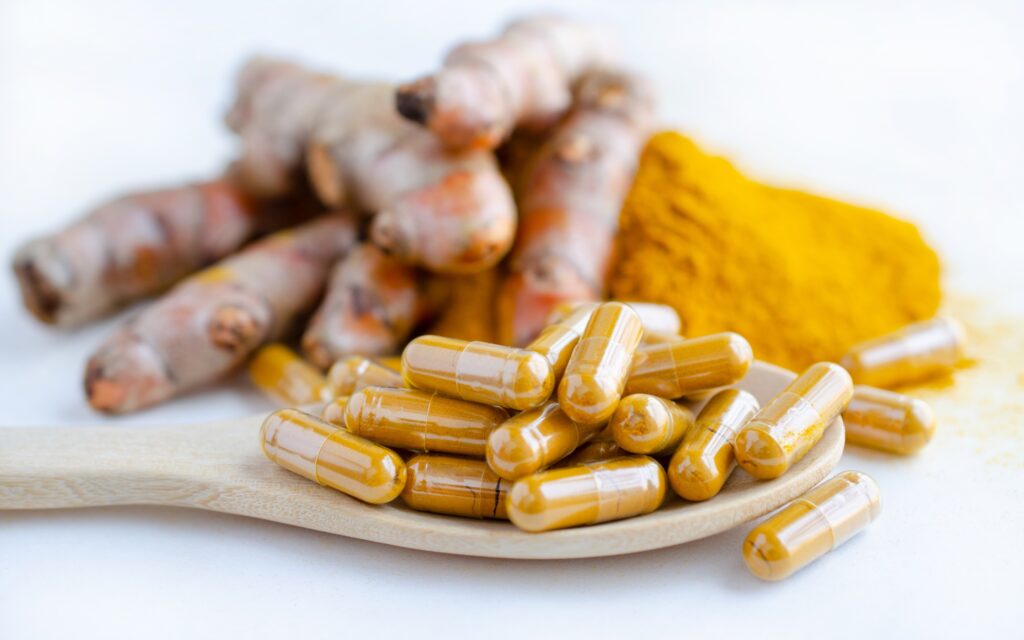Is using turmeric for sleep an effective way to address some of your issues with insomnia? Over the last few years, the popularity of this unique spice has accelerated, as scientists have uncovered the countless anti-inflammatory benefits it has to offer.
Turmeric shines as a phenomenal natural solution for a range of different conditions, from sore muscles to high blood pressure.
However, we’re still learning about the potential benefits of turmeric for insomnia. Some researchers believe this powerful substance can boost your chances of a good night’s rest.
Turmeric could eliminate some of the issues, which might stop you from falling asleep, like pain and discomfort. Others think turmeric is great at reducing anxiety and stress, so you can relax for sleep.
If you’re looking for a natural way to enhance your sleep quality, here’s everything you need to know about the soothing capabilities of turmeric for sleep.
Turmeric and sleep: What is turmeric?
Before we look at the connection between turmeric and sleep, it’s worth identifying this unique spice. Considered one of the most effective nutritional supplements available, turmeric is a golden-colored substance used extensively throughout Southeast Asia, China, and India. It’s the product which gives most curries its yellow color, and it appears in a number of exotic dishes.
Turmeric is packed full of substances called “curcuminoids”, which are said to have medicinal properties. Various bioactive compounds within the spice can assist with reducing inflammation, and fight off common diseases.
Scientists believe curcumin in turmeric can fight inflammation, and lower a person’s risk of heart disease, metabolic syndrome, and other chronic conditions.
Turmeric can help to increase the antioxidant capacity of the body, as it’s a potent antioxidant, capable of fighting free radicals. Studies have also shown this substance can increase levels of BDNF (Brain-Derived Neurotrophic Factor) which plays a crucial role in memory and learning.
Outside of these benefits, turmeric also has a range of other advantages, it may be able to:
- Lower your risk of blood clots by improving the functioning of the endothelium (the lining of your blood vessels).
- Prevent cancer by contributing to the death of cancerous cells, reducing metastasis, and generally lower levels of inflammation.
- Treat Alzheimer’s disease by limiting the levels of oxidative damage and inflammation which could have a negative effect on the brain.
- Address the symptoms of arthritis by reducing discomfort and inflammation around the joints.
- Fight against depression and other mental health conditions by boosting both BDNF levels and serotonin in the brain.

The benefits of turmeric for sleep
For people suffering from insomnia, turmeric and sleep could have a positive connection. Our research into the impact of this substance is still ongoing. The way we sleep is controlled by the production of various brain chemicals, and it can be influenced by various factors, including your lifestyle and diet. However, there’s also a link between sleep and inflammation.
Cytokines, a form of regulatory glycoprotein, act as chemical messengers for the immune system. While some can promote sleep, others can disrupt your sleep pattern.
In general, cytokines like interleukin increase at night, inducing sleepiness. So, the less sleep we get, the more inflammatory markers begin to increase instead, causing further disruption.
Many of the herbal and natural remedies used to target insomnia take a multi-faceted approach to modulating cytokines, reducing inflammation, and managing neurotransmitters at the same time. This is why various experts are beginning to look at turmeric for sleep.
Turmeric can help to reduce the inflammation which might exacerbate conditions preventing you from getting a good night’s rest. It acts as a cytokine modulator, hence suitable for reducing the expression of pro-inflammatory cytokines.
Although experts aren’t sure whether turmeric for insomnia is as beneficial as other natural supplements like melatonin, they do believe it could be beneficial for targeting certain kinds of sleep disorders.
Will turmeric make you sleepy?
At a core level, researchers believe the anti-inflammatory and antioxidant capabilities of turmeric could be a powerful way to enhance a person’s quality of sleep. Curcumin can increase serotonin and dopamine production, helping to promote a positive mentality – often necessary for falling asleep more easily.
Some of the most significant benefits of using turmeric for sleep might include:
Reduced inflammation and pain
The more pain you feel as a result of inflammation throughout your body, the harder it will be for you to find a comfortable position for sleep. Turmeric can help to alleviate this discomfort, so you can fall asleep in a restful state.
Minimizing stress
The stress hormone cortisol is usually highest first thing in the morning. Cortisol helps to keep you alert for the day ahead, and fights off melatonin (the sleep hormone). High levels of this hormone at night can make it harder to fall asleep, as your brain is more likely to be active. Turmeric can help to reduce the stress hormone produced by the body in response to inflammation.
Better mood
Depression and sleep are closely linked. Mood problems including depression and anxiety can make it more difficult to fall asleep at night. Depression is also closely connected with inflammation. Researchers believe turmeric may be effective at reducing inflammation which causes depression, while boosting dopamine and serotonin in the brain.
There’s also a possibility turmeric could be helpful at fighting against one of the most common causes of poor sleep – sleep apnea.
Researchers have found a connection between obstructive sleep apnea and inflammation. Reducing inflammation with turmeric could be an effective way to help the body breathe better, and minimize the number of times you wake up at night.

Is turmeric and milk good for sleep?
Turmeric supplements on their own could be a useful tool for people in search of a natural sleep-enhancing solution. However, there are also people who prefer to combine turmeric with other substances to promote good sleep.
For instance, many people already know the benefits of drinking warm milk before bed for promoting relaxation. Golden milk is a special kind of warm milk drink made with turmeric, which could further enhance your ability to sleep.
The drink contains ingredients packed with valuable vital compounds, amino acids, and antioxidants. Golden milk can also aid some people with issues like poor digestion, which can often keep us awake at night.
While the recipe for golden milk can vary, it usually includes:
- Milk: Hot milk contains substances like tryptophan, which assist with the production of serotonin and melatonin, getting your brain ready for sleep.
- Almonds: Ground almonds are rich in magnesium which promotes muscle relaxation and sleeping. You can also use almond milk, or almond butter for golden milk.
- Honey: Honey for sweetness is excellent at allowing tryptophan from milk to enter the brain more easily, so you can feel more relaxed.
- Ginger: Ginger is fantastic for calming the stomach and reducing nausea. It can also help to minimize anxiety, and promote relaxation.
- Turmeric: The dose of turmeric in golden milk has calming properties, aids with digestion, and eliminates aches and pains, so you can fall asleep soundly.
- Black pepper: Black pepper promotes the properties of turmeric.
- Cinnamon: Like ginger and turmeric, cinnamon also assists in digestion, and supports health metabolic functioning.
Is turmeric good for sleeping?
If your problems with sleep stem from inflammation which causes pain or discomfort throughout your body, turmeric could be a good choice. It might also fight back against depression and anxiety, which can disrupt sleep.
Turmeric offers a natural way to regulate some of the chemicals in your brain, and assist you in finding the relaxation you need for a good night’s rest. However, the research into the benefits of turmeric available today is still somewhat limited. We need to explore turmeric further to understand how it really works for sleep.
Notably, if you do plan on taking turmeric for insomnia, it’s important to ensure you know how to use it correctly. The key ingredient in turmeric for sleep is curcumin, which has a low level of bioavailability.
This means it needs to be paired with a bio-enhancer to improve the uptake within your blood stream. Pipeline, which is the compound in black pepper, usually helps to enhance the bioavailability of curcumin by up to 2000%, and is included in many turmeric supplements.
If you’re using golden milk or turmeric tea for sleep, you may need to ensure the ingredients of your drink also include a bio-enhancer to get the best results.
Should you try turmeric for sleep?
So, should you use turmeric for sleep? It all depends on your specific sleep issues and preferences. In some cases, this product can be a fantastic substance for boosting sleep quality and reducing inflammation. However, it won’t necessarily cure all issues with insomnia.
Experts believe turmeric might not become the next best sleeping pill, but it could be a valuable supplement for people who regularly suffer from sleep disturbances. At the very least, taking a turmeric supplement before bed can help to reduce the inflammation and other issues which could prevent you from resting soundly throughout the night.
Just make sure you’re safe to take turmeric and you don’t have any allergies before you start experimenting with the spice.
Siestio. Sleep matters.
General advice disclaimer
This article contains general tips and advice. However, no diet or exercise program should be started without consulting your physician or other industry professional first. For more information read our full disclaimer here.







